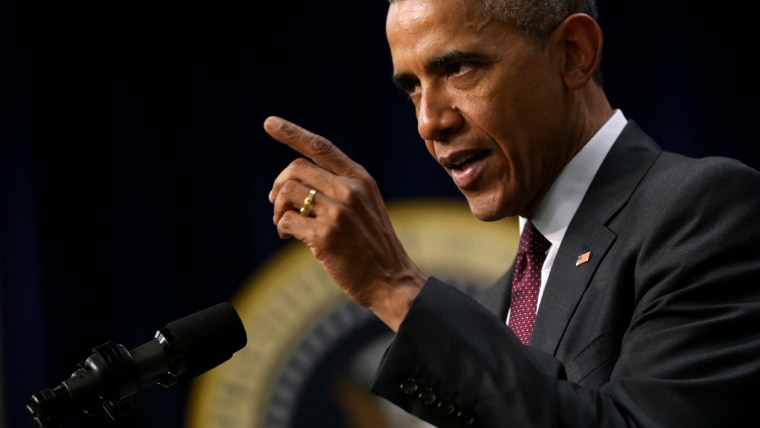The
latest report from the Pew Research Center offered generally good news for President Obama -- Democrats' favorability is improving, while Republicans' favorability is sinking -- but there was one trouble area for the White House that stood out.
Just over half of Americans (53%) continue to say that Barack Obama's approach to foreign policy and national security is "not tough enough"; 37% say he handles these matters about right, while just 4% say he is too tough. These attitudes are virtually unchanged since November 2013. Republicans are far more critical of Obama's approach to foreign policy than Democrats or independents.
Indeed, the partisan split matters. A 53% majority believes the president's approach to national security isn't "tough enough," but that's exaggerated a bit because a whopping 80% of Republicans have convinced themselves this is true. The numbers of Democrats and Independents who agree is significantly smaller.
Still, it's a deeply odd thing for a majority of Americans to believe. Consider something Obama
said this week during his address to the VFW National Convention:
"I've shown I will not hesitate to use force to protect our nation, including from the threat of terrorism. Thanks to the skill of our military and counterintelligence professionals, we've struck major blows against those who threaten us. Osama bin Laden is gone. Anwar Awlaki, a leader of the al Qaeda affiliate in Yemen -- gone. Many of al Qaeda's deputies and their replacements -- gone. Ahmed Abdi Godane -- the leader of the al Qaeda affiliate in Somalia -- gone. Abu Anas al-Libi, accused of bombing our embassies in Africa -- captured. Ahmed Abu Khattalah, accused in the attack in Benghazi -- captured. The list goes on. If you target Americans, you will have no safe haven. We will defend our nation."
As of yesterday, Abu Khalil al-Sudani, the al Qaeda operative "in charge of suicide bombings and operations involving explosives" was
killed by U.S. forces, which means he can be added to Obama's "gone" list.
I'm reminded of Jeffrey Goldberg's
point from last year: "Obama has become the greatest terrorist hunter in the history of the presidency."
So, what's with the "not tough enough" concerns?
As we
talked about a while ago, I suspect Republican rhetoric is a key factor in Republican perceptions. The more Obama orders strikes on terrorists, the more GOP officials feel the need to pretend the president is indifferent to matters of national security, all evidence to the contrary notwithstanding.
Note, for example, just how many Republican leaders, candidates, and officials have said the president is doing "
nothing" about ISIS, even as the president orders literally thousands of airstrikes on ISIS targets in the Middle East.
What's more, Republicans have gone to extraordinary lengths to move the goal-posts -- what
really matters, the GOP argues, isn't whether the Obama administration kills terrorists, but rather, whether the Obama administration uses
words and phrases Republicans find ideologically satisfying.
Sure, killing bin Laden is nice, but for many on the right, if the president doesn't explicitly use the phrase "Islamic terrorism," preferably every day, a successful counter-terrorism strategy doesn't really count.
There is, of course, an entirely different side of the debate, including questions from the White House's progressive critics. Do U.S. strikes deter or prevent future terrorist threats? Is the U.S. policy entirely consistent with the law? What are the implications of a policy reliant on drones? Should Americans expect the current national-security policy to remain in place indefinitely? What happens when one terrorist leader is killed, but he's replaced by someone worse?
The answers to these questions matter, and shouldn't be overlooked by chest-thumping.
But there's still the matter of mistaken public perceptions, which appear increasingly divorced from reality. If a president with Obama's record isn't "tough enough," who is?
